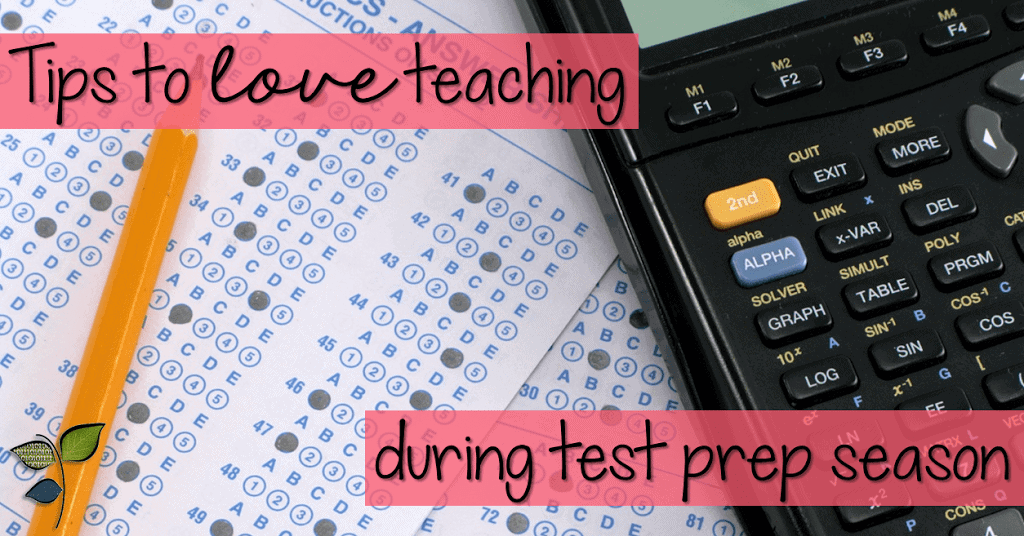When state testing is around the corner, two things seem to happen: stress levels rise, but student and teacher happiness falls. Some of this is inevitable. High stakes testing is by definition stressful because it is a quantitative measure of things that are near and dear to our hearts.
As a teacher you love your students, feel satisfaction in their learning, despair when they do not seem to understand, and rejoice when they do. How can these be quantitatively be measured by one test?
When test prep starts, your love of teaching doesn’t have to end. Even though you are working toward a specific and demanding goal, there are some ways to like, even love, teaching during the review weeks leading up to your state test.
Tip 1: Don’t sweat the small stuff
Not all content is created equal. Are there some things that your state tests more often than other skills? Is there one topic you can review that will help build many other concepts? For example, in the Texas sixth grade math state test, the computations and algebraic reasoning is more highly tested than geometry. If I am pressed for time, what should I probably review, equations or area? Based on what I know about my state test, sixth grade has a stronger focus on algebra than geometry. If I review algebraic concepts I am more likely review a greater percentage of materials on the test. Does your grade and state have a focus? This should be your focus during review, too. Another thing to think about is to find a topic with far reaching value. My fifth graders will be well served to review multiplication of decimals because this topic is an important base to other fifth grade topics like modeling multiplication, area, volume, and even division and order of operations!
This can also help you eliminate topics during review time. For example, my fifth graders have a very difficult time rounding. This is an important skill, but based on my state standards, this is not a fifth grade focus. Its just a little piece of the curriculum. Base on this, what I am not going to do is kill myself trying to teach my students to round numbers the weeks leading up to the state test. It will make the kids frustrated and feel defeated, it will make me frustrated, and rounding is likely going to be a very small part of the test.
Summary: Spend the most time on the most important topics, not the most difficult topics.
Tip 2: Keep building relationships with small group instruction
It is easy to enter “Teacher Panic Mode” when test prep season starts. For many teachers this means moving the desk into rows and ending anything that resembles “fun” because this test is serious business, right? Fight the urge, don’t panic, and teach on! Continue your small groups and if you don’t normally use small group instruction in your math classroom, now is a good time to use it. Small groups allow you to differentiate review for students with different needs. You probably have some students who you are trying to get to an advanced or high level score while others you are just trying to ensure they pass or show growth. These kinds of kids need different instruction, but you already knew that! What you might not have thought of, is small groups are a great way to stay connected with your students. They are getting nervous for the big test, too! Spending time together in small groups will help reassure your students that they are ready and they can do well on the test. Working with kids on a similar level will help let them know that they are not the only kid who still doesn’t understand multiplying fractions and that they can learn how. As a teacher, my favorite time in my classroom was working with small groups. You just get to see the kids differently in that environment than in a whole group setting.
Summary: Small groups are not only academically beneficial, but they are good for you and your students’ emotional well being, too.
Tip 3: Use engaging resources
 |
| An example of my leveled task cards. |
Everyone loves a nice, long test prep packet, right? Of course not! There is little in this world that
the average middle school student finds more mind numbing than a packet. Not only is it boring, it already looks like a test, so not only are students nervous about the test, but they get the testing experience for days before. There are other types of academic and rigorous materials that are much more engaging. One of my favorite is leveled task cards. I have bought some and made my own depending on what I could find. My favorite type for getting ready for a test have two important qualities: they have word problems, they have a variety of difficulty levels. I also like collaborative problem solving activities that allow students to work in small groups to discover the answer to more complex problems. When test strategies must be taught, limit the size and quantity. Try just using one page at a time, rather than handing out a whole packet.
Summary: Days and days of packets are boring, try task cards or other more engaging work.
Tip 4: Know where to start
When thinking of what to review first one thing that seems natural is to go over what the students had the most trouble with. This is not necessarily a good plan. Think about this: you have a short time to review what will help your students improve their achievement on the big test. If many students had trouble with it the first time though and during regular class review after that there may be one of two issues. One, the topic is really difficult, and your students may not be developmentally ready for it yet. Two, (and this is one we don’t want to admit as teachers) you may not be very good at teaching that topic. Unless one of those two things have changed–maybe your students are more mentally mature by the second semester, or you attended some awesome professional development on teaching this topic, both of which are quite possible–the lesson will probably end the same way as it did the first time. Instead of choosing the topic that your students had the most trouble with you are going to choose a “just right” topic. Look for something that you middle of the road kind of kids did just “okay” on. Your higher kids probably did pretty well on it and your lower kids probably struggled. If you choose this type of topic, you are more likely to be able to make a big impact on your students’ understanding and performance. Why? You are probably good at teaching this and your students are probably ready to learn it. The average student is going to go from “sort of” understanding to a full understanding and your lower students are going to finally “get it.” You and your class will feel real success and that is the boost you need as you head into the test! After you have covered some “just right” topics, if there is time, then you can move into some of the more difficult materials.
Summary: During review, time is short, choose topics that you can make a big impact in student understanding in a small time span.
Tip 5: Keep student anxiety low by keeping it positive
Many students are a nervous wreck when it comes to taking big tests. Help your students feel at ease and confident as they prepare. You may not believe it, since you an amazing teacher who reads cool educational blogs to improve yourself and your teaching, but there are actually teachers out there who repeated tell students that they are going to fail their big test! As an instructional leader, I have actual dealt with this exact situation. The teacher was in a panic that huge portions of her class were going to fail, and she told them that. The kids were devastated or worse, indifferent. Even if you are concerned that a student might not pass, focus on the positive. Encourage the students that they can always show growth. No matter at what point they are starting, a student can always show improvement and effort. In Texas, the state testing even recognizes student progress as part of the testing results. You can also encourage your students without making them anxious with friendly competition. Let classes compete against another class for which can show the most improvement or students can even compete against their own past achievement and see what new accomplishments they can make. Just remember to keep it friendly and fun. One year we had a sports theme that the students loved. Another time I was working with a group of students who had not passed the first round of testing and were having to take another test. We looked at it like they were the underdogs and the whole stadium was rooting for them. They loved the idea of making “the comeback” and showing the world they could do it!
Summary: Keep it positive! No one wants to enter into the test already defeated. Every student can show improvement.






